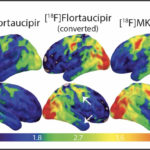The National Institutes of Health (NIH) recently awarded more than $40 million, distributed over five years, for a project that aims to compare two positron emission tomography (PET) imaging agents widely used to visualize misfolded tau protein—one of the hallmarks of Alzheimer disease (AD) and other dementias—in living brains. The effort will be led by co-principal investigators Suzanne Baker, a computational staff scientist in the Molecular Biophysics and Integrated Bioimaging (MBIB) Division, and Tharick Pascoal, an assistant professor in the department of psychiatry at the University of Pittsburgh (Pitt).
Was this page useful?
Send




